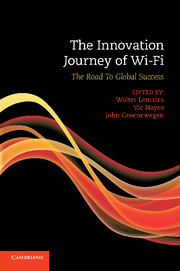Preface
Published online by Cambridge University Press: 05 June 2012
Summary
In 2003 the Dutch Ministry of Economic Affairs commissioned a study to assess the position of the Netherlands with respect to information communications technology (ICT) knowledge and ICT innovation. This project was awarded to a consortium led by Capgemini, in cooperation with the Strategy Academy and Zenc. As I was associated with the Strategy Academy, and in recognition of my experience in the telecommunication industry, I was invited to carry out a series of interviews with experts in the communications technology sector. A wide range of firms was being targeted, from start-ups to well-established companies, manufacturers and service providers, covering multiple technologies and applications. The list included Bruce Tuch, the director of technology strategy and standards at Agere Systems, leading the Wi-Fi efforts from the Utrecht Systems Engineering Centre, in the Netherlands.
At Lucent Technologies I had been involved with the WaveLAN product line to explore business opportunities in the public communications sector, but I was not aware of the genesis and development of Wi-Fi and the role NCR, AT&T and later Lucent Technologies had played, or, for that matter, the role of the Engineering Centre. The enthusiasm that Bruce Tuch conveyed in relaying the innovation story of Wi-Fi was captivating. I became convinced that this narrative had to be recorded and shared. When attending the ‘Creative capital’ conference in Amsterdam the following spring I observed that the TV series Big Brother was being presented by a government official as an important example of Dutch innovation. Clearly, Wi-Fi was not yet recognised as an applicable case example. Something had to be done. In the autumn I attended a seminar organised by the Royal Institute of Engineers featuring Vic Hayes on the topic of IEEE 802.11. For ten years Vic had been the chairperson of the working group responsible for the standardisation of wireless local area networks, to become commonly known as Wi-Fi. I learned that Vic was about to retire; this was the moment.
- Type
- Chapter
- Information
- The Innovation Journey of Wi-FiThe Road to Global Success, pp. xv - xviPublisher: Cambridge University PressPrint publication year: 2010
- 1
- Cited by



